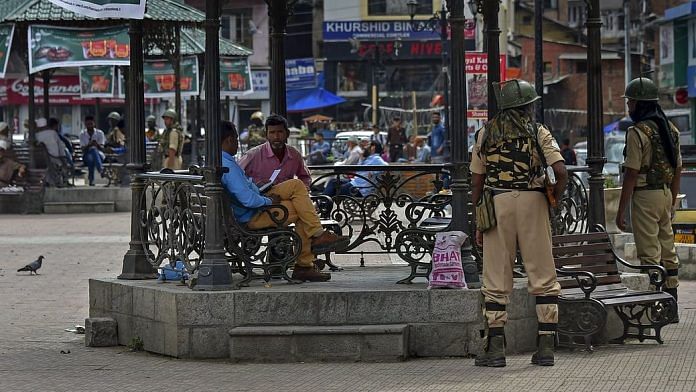New Delhi: The Jammu and Kashmir government has confirmed the grant of domicile certificates to over 83,000 “ non-state persons ” in the Union Territory (UT) in just the past two years, giving them permanent residency, in a revelation that has reignited debates over identity, employment and demographic transformation. The information came in response to a starred question by Peoples Democratic Party (PDP) leader and MLA Waheed Ur Rehman Para at a recent session of the J&K assembly. According to the J&K revenue department’s official reply, of the 35,12,184 domicile certificates it issued since 2022, 83,742 were to people who, previously, did not qualify for permanent residency in the erstwhile state.
Speaking to ThePrint, Waheed Para said for the first time, empirical data had emerged to back a “ growing fear ” among the people of Jammu and Kashmir. “ The questions are: who are these people, and on what basis have they been granted the certificates, especially when there was no elected local government in place? ” he said. Moreover, a non-state subject with a domicile certificate can now apply for government jobs, giving competition to the local youth.

With their domicile certificates, students from other states can also get admitted to educational institutes and sit for professional examinations in the UT. The certificate also grants the right to purchase property in J&K. Waheed Para called for an investigation into the issuance process of the domicile certificates and their rollback.
“ Eighty thousand people equate to one electoral constituency. It is going to alter the demographics, influence the delimitation process, and eventually, change the political and electoral realities of J&K, ” he said. He further alleged that Kashmiris were being “ systematically disempowered ” from jobs and admissions, and their access to land and minerals, while everything was being “ handed over to outsider s”.
“ We are being reduced to non-persons in our homeland, ” he said, adding that outsiders were increasingly occupying positions in institutes established for the UT’s youth. Citing growing resentment among students, Para said, “ Kids from Bihar and UP are getting admissions in GMC (Government Medical College) and NIT (National Institute of Technology), while our students are left behind. Our youth are angry and anxious because their only lifeline, government employment, is now under threat .
” Also Read: Cleared in 2017 for Mountain Strike Corps, 72 Division now being raised in Ladakh. Here’s why Dogra ruler Maharaja Hari Singh enacted the state subject laws in 1927 to restrict the rights to employment in government and the rights over land for non-state persons in Jammu and Kashmir. The large-scale issuance of domicile certificates follows the August 2019 abrogation of Article 370 by the Bharatiya Janata Party-led Centre, stripping the region of its special status and unique permanent resident laws.
In May 2020, the J&K administration notified new rules under the 2020 J&K Grant of Domicile Certificate (Procedure) Rules that effectively redefined the eligibility criteria for permanent residency. Under the new rules, any Indian who has resided in J&K for 15 years, studied for seven years or appeared for Class 10 or 12 exams in the Union Territory qualifies for domicile. Children of central government officials, armed forces personnel, and others posted in J&K are also eligible.
The new rules opened the door to previously excluded groups, such as West Pakistan Refugees, ‘ safai karamchari s ‘, and children of women married outside the region, to apply for domicile. However, the fallout of the rules has not been all positive. Kanwal Singh, a political analyst based in Jammu, highlighted the growing concerns among the native youth, particularly in the face of chronic unemployment and limited economic opportunities.
“T here are no major industries here. Unlike Delhi or Gurugram, we do not have a thriving private sector. For most young people in J&K, the only viable employment option is a government job.
And now, with over 83,000 non-locals eligible to apply for those jobs, the pressure on the local youth is immense, ” Singh told ThePrint. He questioned the lack of transparency in the government data on issuing domicile certificates, highlighting that the people of J&K were in the dark about who was becoming a permanent resident. “W here they are from, how old they are, or what sectors they belong to.
83,000 is a big number for a region like J&K, ” he added. Referring to a 2018 survey under the governorship of Satya Pal Malik, Singh said that over two lakh postgraduates in J&K had been unemployed pre-pandemic. “ After the abrogation of Article 370, the lockdown, and COVID-19, employment prospects only worsened.
These numbers have not improved. So, naturally, people feel cornered, ” he added. Like Para, Singh warned of a shifting demographic pattern, especially in Jammu, which he called the “ entry point ” into J&K from neighbouring states such as Punjab and Haryana.
He said that Jammu might see the first wave of settlement. “ Already, you see small colonies of labourers from UP and Bihar setting up markets and communities in Jammu, ” Singh said, adding that Jammu has always been cosmopolitan, “ but the influx rate now could strain its infrastructure and resource s”. Also Read: Centre might need to do business with J&K’s mainstream parties.
Even if it’s painful for Modi Both Para and Singh fear that the large-scale issuance of domicile certificates may also have long-term consequences on the region’s political representation and social stability. “L adakh was taken away [from J&K and is currently a separate Union Territory]. Delimitation has already skewed political weightage.
Now, with the outsiders added to the electoral rolls, our voice will get weaker. They are outnumbering us and sacrificing our merit in the name of development and integration, ” Para said. The ruling National Conference in the Union Territory also flagged the problems while advocating for full statehood.
Speaking to ThePrint, NC leader Tanvir Sadiq said, “ This is neither a policy we support nor a position we endorse. It is a direct consequence of the laws imposed on Jammu and Kashmir consistently failing to reflect the will or serve the interests of its people .” “W hile several states across India continue to uphold their domicile protections, J&K has been uniquely stripped of such safeguards.
This pattern of disregard demands serious review, which can only begin after the restoration of full statehood, ” he added. Sonu Singh, a social activist and Katra village sarpanch, told ThePrint, that what was bothering the local youth. “I will talk specifically about my home, Katra.
We have nearly 600 voters under our panchayat. At least 30 of the voters are from outside, ” he said. “ Recently, we received a list of jobs; most jobs went to people with domicile certificates, creating competition between our kids and the kids from outside.
None of our kids got the jobs. Every pujari hired at the Mata Vaishno Devi temple] is from other parts of India. In J&K, we have our pandits, who were left out.
” “O ur kids did not have much idea about CBSE schools. But kids who come from outside and take admissions here are well-versed with it. People from outside have started buying land here, and even our jobs are going to outsiders.
Our entire system stands ruined now. People already were jobless, and now anyone who has lived in J&K for 15 years can get a domicile certificate, ” he explained. Highlighting the limited resources of the Union Territory, he pointed out the dire conditions facing locals.
F ifteen years is nothing. One can work at a place for 15 years, but that does not mean they will get the domicile. If they get all the facilities, what will we get? We are facing extreme problems because of this [change].
Our kids do not have jobs because kids from Delhi and Bombay are getting them .” (Edited by Madhurita Goswami) Also Read: Solar glow in remote border village, as Indian Army illuminates Simari near LoC in Kashmir Many of the children of defense forces who served in J&K have birth certificates from J&K. These may number in lakhs.
Will these children get domicile certificates from J&K government? Will they be able to compete for jobs in J&K, a state where their parents served risking their lives or laid their lives against terrorists? The Union government must allow Hindus from other parts of India to settle in Kashmir valley. Massive scale migration in the Kashmir valley will serve as a deterrent to Pakistan’s nefarious designs on the region. Save my name, email, and website in this browser for the next time I comment.
Δ document.getElementById( "ak_js_1" ).setAttribute( "value", ( new Date() ).
getTime() );.
Politics

Domicile certificate data revives ‘identity’ debate in J&K, fears of becoming ‘non-persons in homeland’

Of the over 35 lakh certificates issued by J&K's revenue department since 2022, over 83,000 were to people who previously didn't qualify for permanent residency in the erstwhile state.















